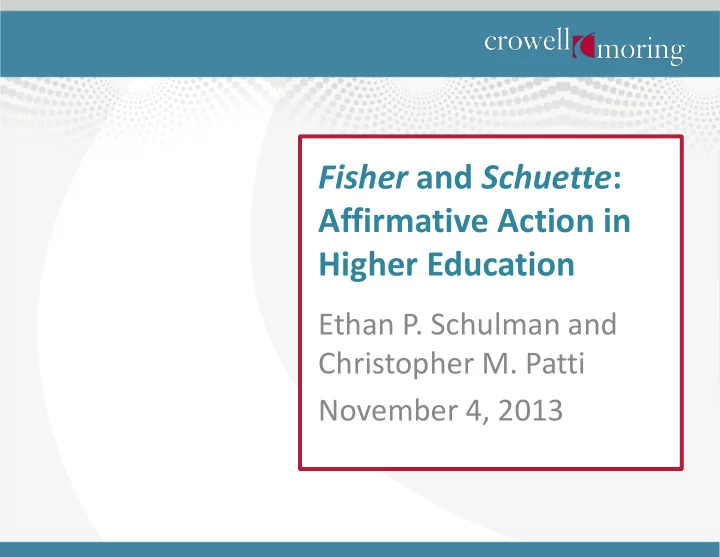

Fisher and Schuette : Affirmative Action in Higher Education Ethan P. Schulman and Christopher M. Patti November 4, 2013
Background: Key Precedents • Bakke v. Regents of the University of California (1978) • Grutter v. Bollinger (2003) • Gratz v. Bollinger (2003)
Grutter : The Benefits of Diversity • “These benefits are not theoretical but real, as major American businesses have made clear that the skills needed in today’s increasingly global marketplace can only be developed through exposure to widely diverse people, cultures, ideas, and viewpoints.”
Grutter : The Military Supports Diversity • “What is more, high-ranking retired officers and civilian leaders of the United States military assert that, based on their decades of experience, a highly qualified, racially diverse officer corps is essential to the military’s ability to fulfill its principal mission to provide national security.”
Grutter : Justice O’Connor’s Prediction • “It has been 25 years since Justice Powell first approved the use of race to further an interest in student body diversity in the context of public higher education. Since that time, the number of minority applicants with high grades and test scores has indeed increased. We expect that 25 years from now, the use of racial preferences will no longer be necessary to approve the interest approved today.”
Fisher v. University of Texas at Austin • Abigail Fisher • The Lower Court Rulings • The Hopwood Decision • UT’s Ten Percent Plan • Other Issues – Critical Mass – Deference to the University
Fisher at the High Court • Not asking the Court to overrule Grutter • Key arguments – “Racial balancing” – Measuring diversity in classrooms? – Effects of Top Ten Percent Law – Minimal effect – Latinos not underrepresented?
Fisher : UC’s Role • One of many amici curiae • Compelling interest in diversity – Campus climate • Experience under Proposition 209 – Immediate aftermath – Measures undertaken – Continuing shortfall, esp. at UCB and UCLA
Fisher : Cause for Concern?
Fisher : Cause for Concern? • “The way to stop discrimination on the basis of race is to stop discriminating on the basis of race.” – Parents Involved in Community Schools v. Seattle School District No. 1 (2007) (Roberts, C.J.) • “It is my firm conviction that no Member of the Court that I joined in 1975 would have agreed with today’s decision.” – (Stevens, J., dissenting)
Fisher : Bakke and Grutter Survive • “Among the Court’s cases involving racial classifications in education, there are three decisions that directly address the question of considering racial minority status as a positive or favorable factor in a university’s admissions process, with the goal of achieving the educational benefits of a more diverse student. We take those cases as given for purposes of deciding this case.”
Fisher : Strict Scrutiny Strengthened • “Strict scrutiny must not be strict in theory, but fatal in fact. But the opposite is also true. Strict scrutiny must not be strict in theory but feeble in fact. In order for judicial review to be meaning- ful, a university must make a showing that its plan is narrowly tailored to achieve the only interest that this Court has approved in this context: the benefits of a student body diversity that encompasses a broad array of qualifications and characteristics of which racial or ethnic origin is but a single though important element.”
Schuette v. Coalition to Defend Affirmative Action • Michigan’s Proposal 2 (2006) • The Proposition 209 Cases • The Schuette Litigation – The political restructuring doctrine • UC’s Role as Amicus Curiae • Predicting the Outcome
Schuette : Michigan’s Proposal 2 • “The University of Michigan, Michigan State University, Wayne State University, and any other public college or university, community college or school district shall not discriminate against, or grant preferential treatment to, any individual or group on the basis of race, sex, color, ethnicity, or national origin in the operation of public employment, public education, or public contracting.”
Schuette : Defining the Issue • “Whether a state violates the Equal Protection Clause by amending its constitution to prohibit race- and sex-based discrimination or preferential treatment in public-university admissions decisions.” – Petition for certiorari (Nov. 28, 2012)
Schuette : Defining the Issue • “Whether a state initiative violates the Equal Protection Clause by amending a state constitution to remove from the ordinary political process of governmental decision- making a constitutionally permissible topic solely because it is “racial in nature.” – Brief for Respondents in opposition (Feb. 4, 2013)
Fisher and Schuette • Questions? Ethan P. Schulman eschulman@crowell.com (415) 365-7852
Recommend
More recommend